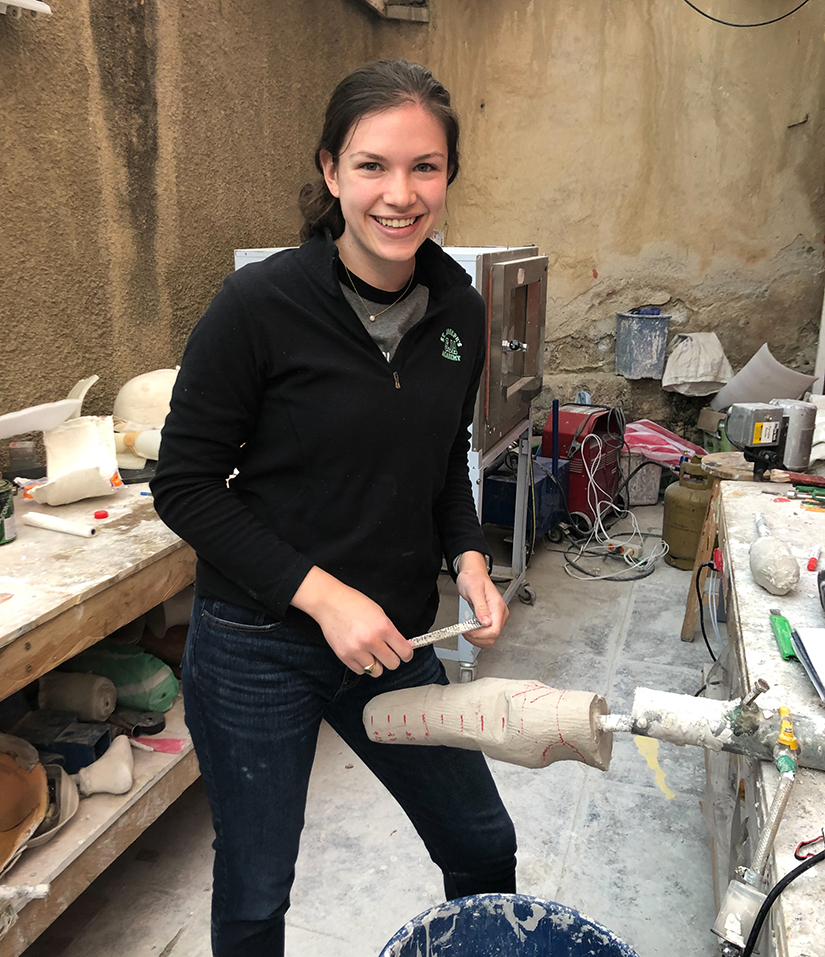 Ellen Lucchesi worked with a mold for a prosthetic at the Funprobo Clinic in La Paz, Bolivia. Lucchesi worked with the clinic as part of Dayton University’s ETHOS Center, which was founded in 2001 by a group of engineering students, to take the curriculum beyond the classroom.Photo Credits: Photo courtesy of Ellen LucchesiOn a trip to Bolivia last summer, Ellen Lucchesi saw firsthand how her gifts as a budding engineer could help people with physical disabilities.
Ellen Lucchesi worked with a mold for a prosthetic at the Funprobo Clinic in La Paz, Bolivia. Lucchesi worked with the clinic as part of Dayton University’s ETHOS Center, which was founded in 2001 by a group of engineering students, to take the curriculum beyond the classroom.Photo Credits: Photo courtesy of Ellen LucchesiOn a trip to Bolivia last summer, Ellen Lucchesi saw firsthand how her gifts as a budding engineer could help people with physical disabilities.
Lucchesi, a recent graduate of the University of Dayton and alumna of St. Joseph’s Academy, spent 10 weeks in La Paz as part of Dayton’s ETHOS (Engineers in Technical Humanitarian Opportunities of Service) Learning Center. The program allows students a way to apply their technical skills through projects that help improve the quality of life in developing communities around the world.
Lucchesi, whose family attends St. Joseph Parish in Manchester, worked at the Funprobo Clinic with fellow mechanical engineering student Michael Fornadel to help make prosthetics for people with limited resources. The nonprofit clinic is the only of its kind in the South American country and has helped nearly 500 people in the past decade. Lucchesi said diabetes and accidents are among the top reasons for amputations.
The two researched as much as they could before the trip, but much of what they did was learned on the job, putting their engineering skills to work. “I tried to go in with as little expectations as possible,” said Lucchesi, who graduated from the Marianist university in December and recently was hired as a product development engineer with a medical device company in St. Louis. “La Paz was very developed, but nothing like what we have here. The way they make prosthetics there is so different, because they use such random materials. It’s more like scrap metal, things like that.”
Funprobo’s mission goes beyond providing prosthetics, and includes psychological support, helping patients to build their self-confidence as they learn to use their new limbs. Lucchesi said she observed that there is a social stigma against people with disabilities in Bolivia. Many times people are ashamed to be seen in public or are kept secret by their families; it’s also not uncommon for a person to be abandoned at a hospital because of the perceived social and economic hardships by family members.
“We had people come in who had these DIY prosthetics, they couldn’t even wear them because they were uncomfortable and weren’t made properly,” Lucchesi said. “I don’t know how they even walked in, but they were just so determined to live as normally as they could and be accepted by society.”
The fitting process is lengthy, but she said that’s with good reason. “We want them to be as comfortable as possible. They don’t want it to sit in someone’s closet. They want it to actually be worn.”
Victor was the first patient that Lucchesi worked with from start to finish. The former professional soccer player received a new leg that was placed above the knee. Typically it takes about two weeks to learn the mechanics of a new limb and how to walk with it, but Victor told the clinic director he was determined to learn how to do it in less than a week.
“When he came in, he really didn’t have any purpose in life anymore,” Lucchesi said. “He didn’t want to live. It seemed like everything was taken away from him. He was so determined to learn how to walk. He was so excited to be able to work again and provide for his family.”
Lucchesi noted that her Catholic education helped her to see the importance of using her education for a “greater good” and to help others who don’t have the same resources. It also reaffirmed her desire to use her engineering background to potentially help others through the medical field.
Reflecting on the phrase “to serve the dear neighbor” that she learned while at St. Joseph’s Academy, Lucchesi said, “it makes you think about what you’re using your talents for. We all have a duty on this earth to do something good. Seeing people in Bolivia, and how they live so simply and love so much — they’re the kindest and most loving and giving people I’ve ever met. I am privileged to have the things that I do. To give my God-given gifts to other people is important to me.”
ETHOS Center
The ETHOS Center at the
University of Dayton was founded in 2001 by a group of engineering
students, to take the curriculum beyond the classroom. Since then,
approximately 500 students have worked in 20 countries on four
continents. ETHOS also has partnered with more than 50 organizations
worldwide to sponsor the students’ work.
To watch a three-part documentary about Ellen Lucchesi’s work in La Paz, Bolivia, and to learn more about ETHOS Center, visit go.udayton.edu/ethos.